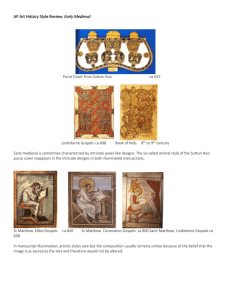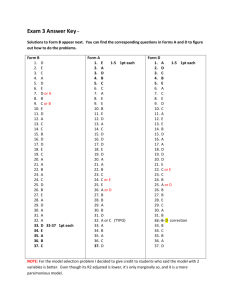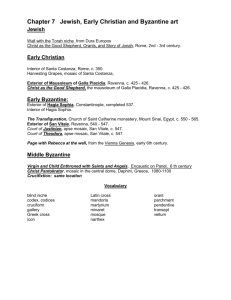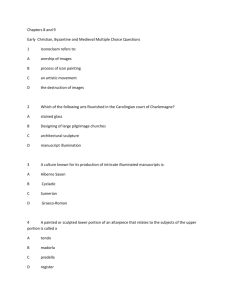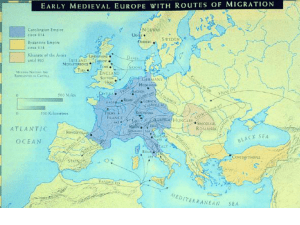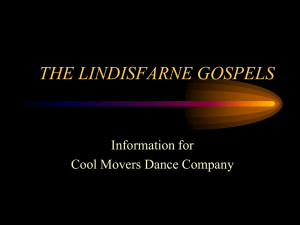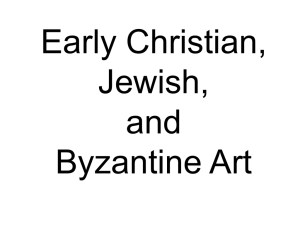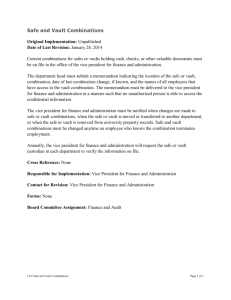Exam 3 with Answers!!
advertisement
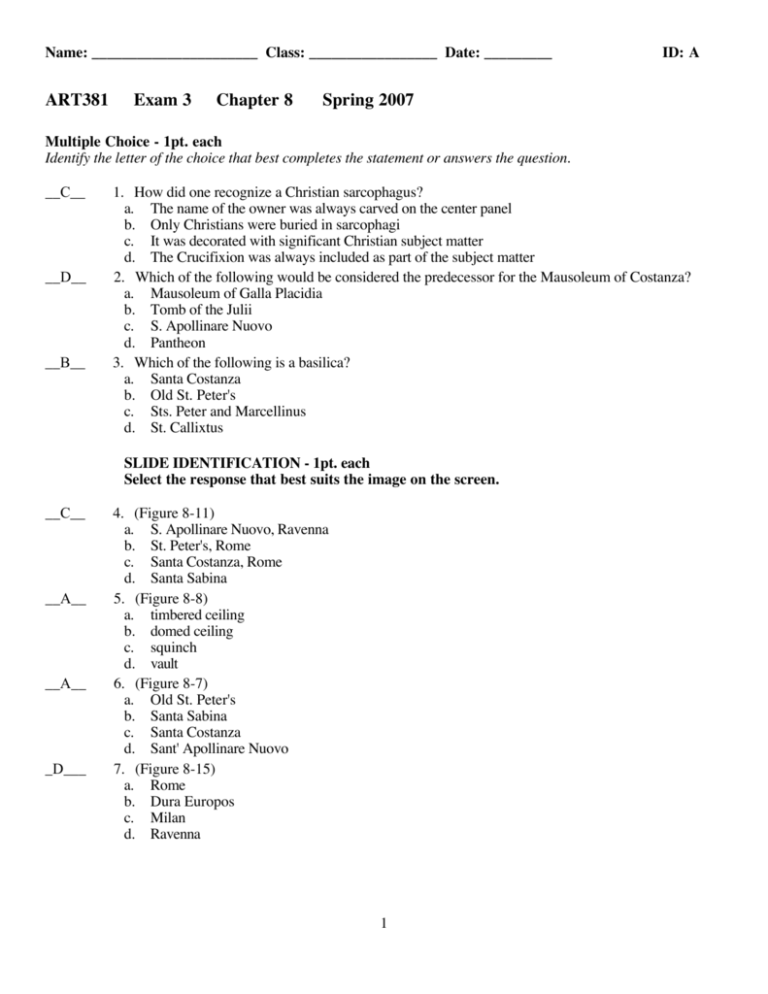
Name: ______________________ Class: _________________ Date: _________ ART381 Exam 3 Chapter 8 ID: A Spring 2007 Multiple Choice - 1pt. each Identify the letter of the choice that best completes the statement or answers the question. __C__ __D__ __B__ 1. How did one recognize a Christian sarcophagus? a. The name of the owner was always carved on the center panel b. Only Christians were buried in sarcophagi c. It was decorated with significant Christian subject matter d. The Crucifixion was always included as part of the subject matter 2. Which of the following would be considered the predecessor for the Mausoleum of Costanza? a. Mausoleum of Galla Placidia b. Tomb of the Julii c. S. Apollinare Nuovo d. Pantheon 3. Which of the following is a basilica? a. Santa Costanza b. Old St. Peter's c. Sts. Peter and Marcellinus d. St. Callixtus SLIDE IDENTIFICATION - 1pt. each Select the response that best suits the image on the screen. __C__ __A__ __A__ _D___ 4. (Figure 8-11) a. S. Apollinare Nuovo, Ravenna b. St. Peter's, Rome c. Santa Costanza, Rome d. Santa Sabina 5. (Figure 8-8) a. timbered ceiling b. domed ceiling c. squinch d. vault 6. (Figure 8-7) a. Old St. Peter's b. Santa Sabina c. Santa Costanza d. Sant' Apollinare Nuovo 7. (Figure 8-15) a. Rome b. Dura Europos c. Milan d. Ravenna 1 Name: ______________________ ID: A Short Answer - ANSWER 1 OF 2 - 3pt. each 8. Who was Galla Placidia? She was half-sister to Honorius, emperor of the West. They both represent the last, painful years of the Imperial Roman Empire. Honorius had to move the imperial capital from Milan to Ravenna in order to defend his "empire" from invasion. Rome, itself, fell in 410 CE to the Visigoths. Galla Placidia had been captured in the fall of Rome and had to wed a Visigoth chieftain. Upon her brother's death, she took the reins of imperial power until her death. 9. What is the significance of Old St. Peter's? Constantine was both Roman emperor and defender of the Christian faith. In order to keep the peace between his Christian and pagan constituencies he order the construction of churches on the city's outskirts. Old St. Peter's was the most magnificent of these Early Christian churches. It was constructed on the spot of Peter's grave, or so it was believed. This was a decision made by both Constantine and Pope Sylvester. This church became the visible sign of the acceptance of Christianity by the Empire. 2 Name: ______________________ Class: _________________ Date: _________ ART381 EXAM 3 Chapter 9 ID: A Spring 2007 Multiple Choice - 1pt. each Identify the letter of the choice that best completes the statement or answers the question. __D__ __C__ __A__ 1. What church combines the intricacies of Greek theology, the ambitious architectural scale of Rome, the vaulting tradition of the Near East, and the mysticism of Eastern Christianity in order to create a monument that is the summation of antiquity and the triumph of Christianity? a. San Vitale b. Sts. Sergius and Bacchus c. Church of the Dormition, Daphni d. Hagia Sophia 2. The images and symbols found in the sanctuary from San Vitale express the single theme of ____. a. the Nativity b. Christ's Crucifixion c. Christ's redemption of humanity d. the Martyrdom of Saint Vitalis (San Vitale) 3. Basil I undertook the repair of damage done during the Iconoclasm. How was this repair initiated? a. by dedicating a new mosaic in Hagia Sophia b. by seeking an alliance through marriage with Charlemagne c. by formalizing relations with the Ottomans d. by commissioning a new royal chapel SLIDE IDENTIFICATION - 1pt. each Select the response that best suits the image on the screen. _A___ __D__ __B__ __A__ 4. (Figure 9-3) a. Hagia Sophia b. San Vitale c. Santa Costanza d. St. Mark's 5. (Figure 9-23) a. San Vitale b. Hagia Sophia c. St. Dimitri d. St. Mark's 6. (Figure 9-12) a. Mausoleum of Galla Placidia, Ravenna b. S. Apollinare en Classe, Ravenna c. Santa Pudenziana, Rome d. Pala d'Oro, Venice 7. (Figure 9-10) a. Justinian b. Theodosius I c. Basil I d. John VII Palaeologus 1 Name: ______________________ ID: A Short Answer - ANSWER 1 OF 2 - 3pt. each 8. The phrase "consequences of iconoclasm" has significant meaning for the history of Byzantine art. Assess the Iconoclasm and its subsequent impact on Byzantine art. It cannot be overstated the damage this period (726-843) had on the art of Byzantium. For 117 years no depictions of Christ, the Virgin, or the saints were allowed. Even more damaging was the concerted effort made by the iconoclasts to destroy countless works from the Early Byzantine period, hence the fragmentary knowledge of this early artistic period. 9. Evaluate the mosaic, Theodora and Attendants from San Vitale. Theodora's presence in the apse marks her position within the Empire and her importance toJustinian. Her very presence and participation in the celebration of the Eucharist ceremony marks herposition in the ceremonial protocol. Not equal to Justinian but important enough to him to be elevatedto role of active participant (only the emperor was permitted in the nave), she carries the chalice. Sheis depicted with the same hieratic formality and solemnity as Justinian. 2 Name: ______________________ Class: _________________ Date: _________ ART381 Exam 3 Chapter 11 ID: A Spring 2007 Multiple Choice - 1pt. each Identify the letter of the choice that best completes the statement or answers the question. __C__ __C__ __D__ __D__ _B___ __D__ 1. What area of Western Europe was never colonized by Rome? a. England b. France c. Ireland d. Spain 2. It has been said that the author-portrait of St, Matthew from the Lindisfarne Gospels shows classical influences. What supports this statement? a. The figure is seated as an imperial emperor. b. The figure is seated as an adjudicating senator. c. The figure is seated as a philosopher or poet reading or writing. d. The figure is seated as an imperial judge. 3. What manuscript is commonly considered the greatest achievement in Hiberno-Saxon art? a. Book of Durrow b. Book of Lindisfarne c. Book of Alciun d. Book of Kells 4. What church plan was used as the model for the palace chapel at Aachen? a. Old St. Peter's b. Santa Sabina c. Hagia Sophia d. San Vitale 5. Irish or Celtic stone crosses are identifiable by which of the following? a. four arms of equal length b. a circle intersecting the cross arms c. extra top slanting bar d. combination swastika symbolizing the four directions 6. It has been said that Charlemagne was a man of great energy and learning, a strong patron of the arts, and a sincere admirer of classical culture. Which of the following do later generations owe to Charlemagne's patronage? a. the restoration of the classical sculptural tradition b. the copying of important Early Christian texts c. the restoration of the Late Imperial Roman Empire d. the copying of important classical texts SLIDE IDENTIFICATION - 1pt. each Select the response that best suits the image on the screen. __A__ 7. (Figure 11-11) a. Charlemagne b. Otto III c. Marcus Aurelius d. Constantine 1 Name: ______________________ __C__ _C___ __B__ __B__ _B___ _A___ _D___ __C__ __A__ ID: A 8. (Figure 11-26) a. Bernward Cross b. Charlemagne Cross c. Gero Cross d. Otto III Cross 9. (Figure 11-17) a. St. Pantaleon, Cologne b. San Vitale, Ravenna c. Palatine Chapel, Aachen d. Saint Michael's, Hildesheim 10. (Figure 11-7) a. Book of Durrow b. Lindisfarne Gospels c. Book of Kells d. Ebbo Gospels 11. (Figure 11-22) a. St. Gall b. Saint Michael, Hildesheim c. Palatine Chapel, Aachen d. St-Riquier 12. (Figure 11-3) a. Anglo-Saxon b. Viking c. Hiberno-Saxon d. Carolingian 13. (Figure 11-8) a. Book of Kells b. Book of Durrow c. Lindisfarne Gospels d. Gospel Book of Otto III 14. (Figure 11-9) a. Migration period b. Ottonian c. Carolingian d. Irish 15. (Figure 11-15) a. Early Christian b. Byzantine c. Carolingian d. Ottonian 16. (Figure 11-6) a. Lindisfarne Gospels b. Utrecht Psalter c. Coronation Gospels of Charlemagne d. Lectionary of Henry II 2 Name: ______________________ ID: A Short Answer - ANSWER ONLY 2 OF 3 - 3pt. each 17. Why is the date, Christmas Day, 800 significant? Pope Leo III crowned Charlemagne Emperor of Rome. The event took place in St. Peter's basilica. 18. Briefly describe a cross-inscribed carpet page from the Lindisfarne Gospels and what does it show? It is a design, which involves the entire page in zoomorphic forms intermingling with clusters and knots producing rhythm and energy yet held in check by the regularity of the design and dominating cross motif. It also shows the marriage of Christian imagery and animal-interlace style of the North. 19. Early medieval civilization in Western Europe represents a fusion of which cultures? It was a fusion of Christianity, the Greco-Roman heritage, and the cultures of the non-Roman peoples north of the Alps. 3 Name: ______________________ Class: _________________ Date: _________ ART 381 Exam 3 Chapter 12 ID: A Spring 2007 Multiple Choice - 1pt. each Identify the letter of the choice that best completes the statement or answers the question. __A__ __A__ __B__ __A__ __C__ _D___ _C___ 1. How did 11th-century Romanesque masons construct monumental groin vaults? a. By using ashlar blocks joined by mortar b. By using ashlar blocks c. By using concrete d. By using rubble blocks jointed by mortar 2. Of the following characteristics, which is not relevant to Italian church architecture? a. verticality b. thick, massive walls c. continuous barrel-vaulting d. groin-vaulting 3. It is said this structure's design is simple and serenely classical. It is a descendant of the Pantheon, the imperial mausoleum, such as Diocletian's, and the Early Christian Sta. Costanza. Which of the following is being described? a. Sant'Ambrogio, Milan b. San Giovanni Baptistery, Florence c. San Miniato al Monte, Florence d. Modena Cathedral 4. The Bayeux Tapestry is unique in Romanesque art. Which of the following supports this claim? a. It depicted an actual event in full detail shortly after it occurred. b. It depicted a tale from the First Crusade. c. It depicted the Mission of the Apostles in full detail. d. It depicted the clash between the Knights Templar and the Saracens. 5. Which of the architectural elements below was used for the exterior supports on Romanesque buildings? a. pendentives b. flying buttresses c. buttresses d. diaphragm buttresses 6. The prophet, identified either as Jeremiah or Isaiah, is tall and thin. The animation of his body reveals the inner passion of his soul. In which of the following churches does this figure appear? a. St.-Sernin, Toulouse b. St.-Génis-des-Fontaines c. San Miniato, Florence d. St.-Pierre, Moissac 7. The Bayeux Tapestry is the conqueror's version of history. It is a narrative that includes the battle sequences as well as the preparations for war. It is said that this is the most Roman of all Romanesque art works. Which of the following supports this contention? a. It has often been likened to the Column of Trajan. b. It has often been likened to the frieze from the Arch of Constantine. c. It has often been likened to the panels from the Arch of Titus. d. It has often been likened to the Column of Marcus Aurelius. 1 Name: ______________________ __C__ ID: A 8. During the Romanesque period the vision of Christ's Second Coming was often depicted on which of the following? a. jambs b. the tribune c. the tympanum d. the trumeau SLIDE IDENTIFICATION - 1pt. each Select the response that best suits the image on the screen. __A__ _C___ __B__ _C___ __D__ _B___ __D__ 9. (Figure 12-40) a. Battle of Hastings b. Battle of Poitiers c. Battle of Verdun d. Battle of Jerusalem 10. (Figure 12-6) a. barrel vault b. ribbed vault c. groined vault d. oval vault 11. (Figure 12-30) a. German b. French c. Italian d. English 12. (Figure 12-31) a. chest b. casket c. reliquary d. wedding chest 13. (Figure 12-34) a. groined vault b. ribbed vault c. oval vault d. barrel vault 14. (Figure 12-27) a. St-Sernin, Toulouse b. St. Trophîme, Arles c. Pisa Cathedral d. Baptistery of San Giovanni, Florence 15. (Figure 12-17) a. French b. English c. German d. Italian 2 Name: ______________________ __B__ __A__ ID: A 16. (Figure 12-15) a. Sant'Ambrogio, Milan b. Durham Cathedral c. San Miniato, Florence d. St.-Étienne, Caen 17. (Figure 12-36) a. Moralia in Job b. Bury Bible c. Eadwine Psalter d. Scivias Short Answer - ANSWER ONLY 2 OF 3 - 3pts. each 18. Evaluate the term Romanesque. How was it applied to the period? It means "Romanlike" and was first applied in the early nineteenth century to describe European architecture of the eleventh and twelfth centuries. 19. How did groin vaults change the weight shift? Groin vaults in the tribune galleries as well as in the ground-floor aisles absorbed the pressure of the nave's barrel vault along the entire length of the nave. The groin vaults served as buttresses for the barrel vault and transferred the main thrust to the thick outer walls. 20. Describe the subject matter of the portal of St-Trophîme, Arles. It is strictly Christian and Romanesque, even with its resemblance to Roman narrative style. It shows Christ with the symbols of the Four Evangelists and directly below him are the Twelve Apostles at the center of a continuous frieze depicting the Last Judgment. The outer most parts are the Saved and the Damned in the flames of Hell, with figures of the saints in classical garb, repeating the Romanesque themes of Salvation and Redemption. 3
